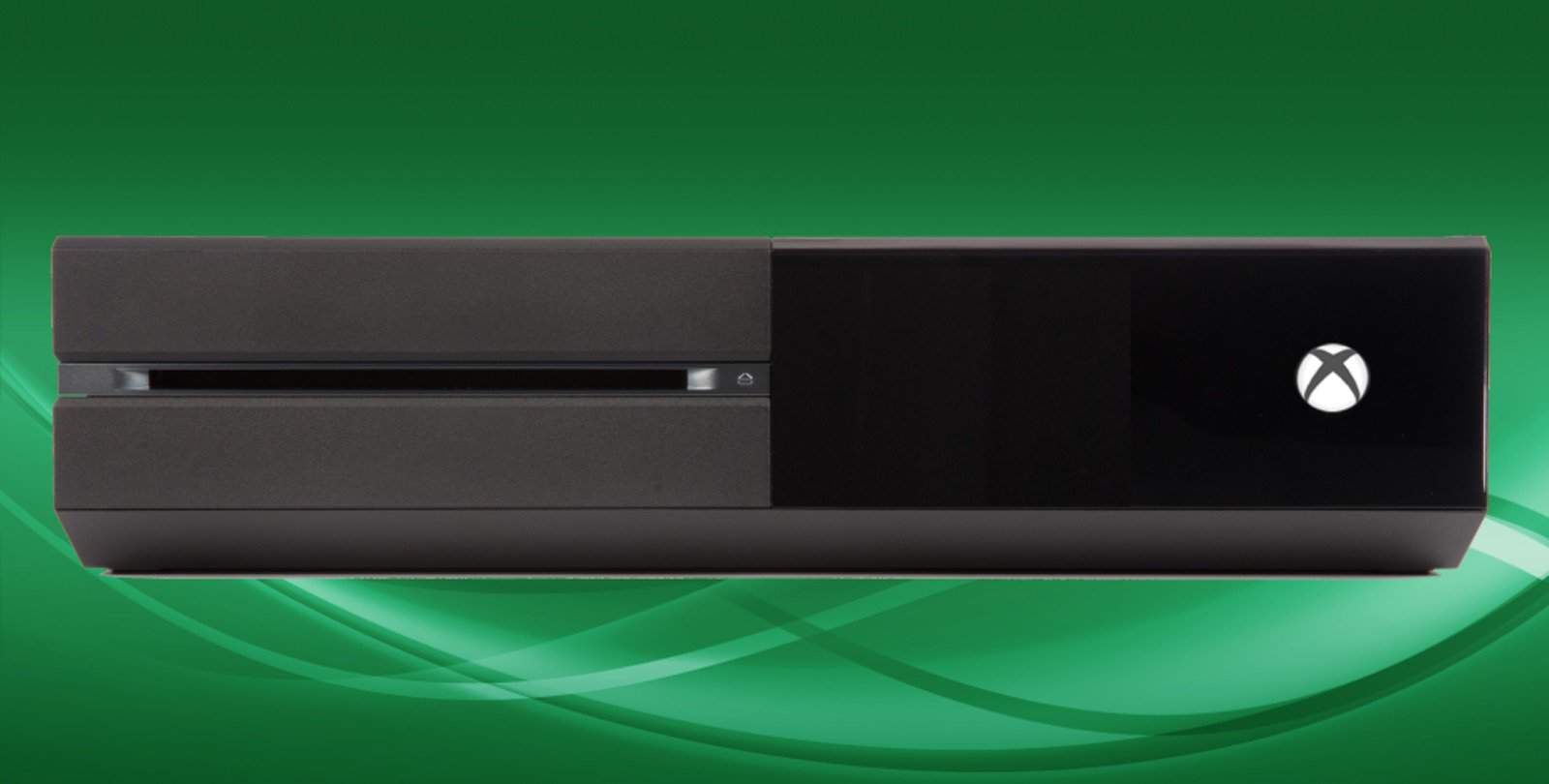Watch Halo The Series from 24 March 2022 on Paramount+ (USA, AUS, EU) or 25 March 2022 on Showmax (ZA)
The adage “never meet your heroes” immediately comes to mind when watching Halo The Series. Unlike the highly successful and popular video games the television series is based on, the show follows an all new ‘timeline’. In so doing, it upends almost everything gamers may be familiar with when it comes to the infamous titular character. The result is a beautiful and enlightening mess, with tantalising ideas of where the narrative might go; and why splitting off from the main canon was the best decision the producers could have made.
In the Halo games, Master Chief is a stoic figure, one who places loyalty and ‘doing the right thing’ above all else. He is infamous in the game universe for being a United Nations Space Command (UNSC) Spartan (genetically enhanced human weapon) who strikes fear into the minds of those he faces, and adoration in the hearts of those he fights for. Little is known about his past, with much of the narrative exposition left to ‘seek and ye shall find’ game devices versus being part of the core plot. Ultimately, his character is a “do gooder” who will always choose to do what he believes is right, regardless of the choices or consequences that lie in his stead.
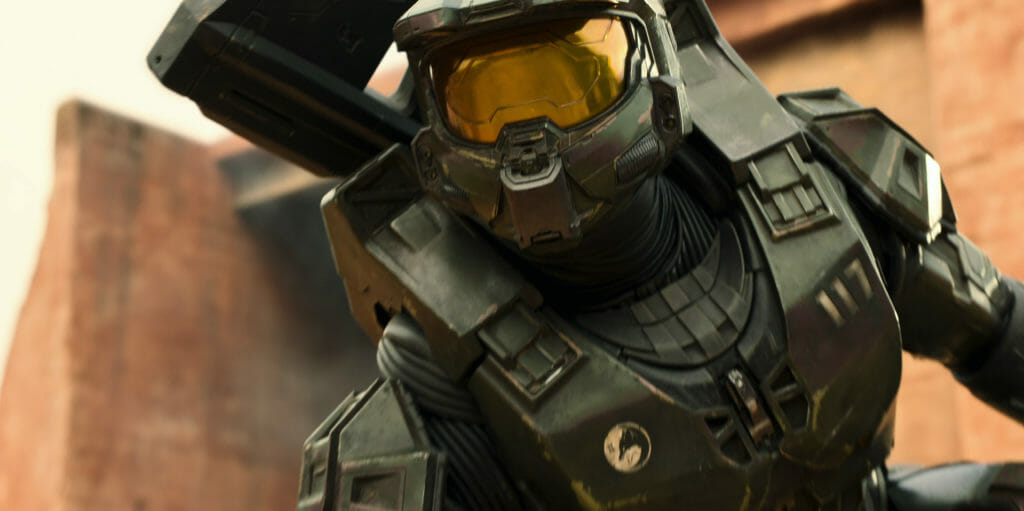
What is most fascinating about Master Chief is how the aforementioned perception of the character is solely based on those who have played the games. Although his motivations and personal story have become part of the geek zeitgeist, his visibility in popular culture is more inline with being the “Xbox mascot“; where his green suit of armour and golden visor are as well known and identifiable as Mario’s monogrammed red cap. As such, it is easy to believe how a large contingent of ‘mass consumers’ really have no idea who Master Chief is or why his adventures in the games are so beloved. Therefore, an opening to introduce the character to thousands of potential new fans exists within the realm of live-action television. The issue, of course, is how does one adapt an already established character for the silver screen without completely ostracising the ever present and loyal fanbase?
In the case of Halo The Series, the answer lies in a nuanced delivery of the all-too-familiar contradicted by completely unique insights into the established characters and world; all of which are told through a completely new timeline created to specifically cater to the needs of a live-action production. The ‘silver timeline‘, as it has been dubbed, allows the television series to be based on the Halo Universe without needing to follow the constraints of the already established canon developed over two decades of games, books and lore. As a result, the series is undeniably Halo at first glance, especially visually. However, gamers who have enjoyed and become immersed in the Halo franchise outside of this timeline will be shocked at the stark contrast between the characters they know, specifically Master Chief, and those portrayed on screen.
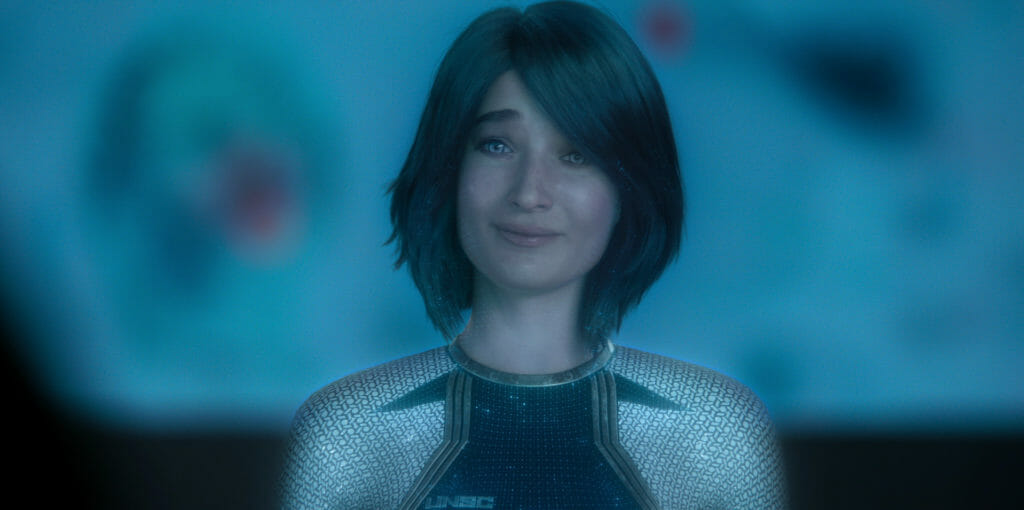
Pablo Schreiber takes on the momentous mantle of portraying Master Chief Petty Officer John 117, whose debut takes place with great fanfare. As part of Silver Team (perhaps a play on the name of the timeline given how chief leads ‘Blue Team’ in the games), John 117 lands alongside Spartans Kai 125 (Kate Kennedy), Vannak 134 (Bentley Kalu) and Riz 028 (Natasha Culzac) on the colony world of Madrigal – a war torn location with rebels fighting against UNSC occupation. It quickly comes to light how an invading force of the highly religious alien Covenant forces are attempting to excavate an ancient artefact. The encounter makes it very clear how Spartans are both revered and feared, with many colonists unwilling to face one in combat whereas opposing alien forces are quick to recognise Master Chief as the infamous “demon” (slayer of Covenant forces).
In line with the early games, the ‘silver timeline’ offers hints of how humanity is currently at war with the Covenant – a group of several different and highly advanced alien races, all united together under a single theocratic hegemony. Thankfully, under the watchful eye of Dr. Catherine Halsey (Natasha McElhone), humanity has the Spartan Program to assist with any and all threats. These groups of elite warriors have been genetically enhanced and chemically castrated (ethics be damned) to serve as loyal pawns for UNSC war efforts, and ultimately serve as humanity’s last line of defence and survival against otherworldly threats. As such, and in the eyes of the UNSC, Master Chief is nothing more than a glorified weapon. A subordinate worker who must do as he is told. A strong, quiet, and focussed soldier who follows any and all given orders, without question. For all intents and purposes, he is the emerald figurehead of the success, reliability and necessity of the program’s existence. However, what happens when the program’s ’crown jewel’ begins to defy his conditioning?
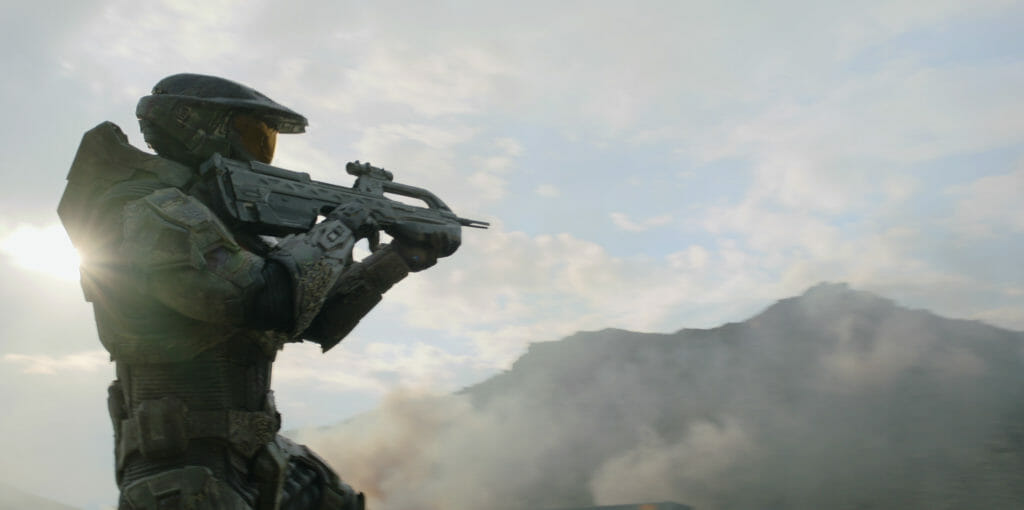
During the Madrigal incursion, Master Chief comes into contact with an ancient alien device the Covenant were seemingly excavating. During retrieval, the artefact reacts to John’s touch – forcing him to recall events from his amnesic past as well as projecting alien signs and symbols that fans of the games will immediately recognise (including how the artefact may be an ‘Activation Index’ for a Halo ring). Although echoing the games to a degree, it is clear the series will diverge more decisively through further exploration and expansion on the idea of a “chosen one”. Hopefully it will offer a slightly streamlined, less convoluted and more believable premise versus what the games have chaotically attempted to express. Needless to say, there is great significance in John’s ability to interact with the device. On one hand, the artefact does not react to everyone, and will only activate when touched by those deemed ‘worthy’. On the other hand, each new voluntary interaction frees more of his chemically subjugated memories, personality and humanity. In so doing, the artefact causes him to question his actions as a soldier and weapon of war; and whether the truth he is being told is the same truth he should be fighting for.
The subtle acknowledgement of John being more than merely a weapon is broached with a surprising amount of grace and care in Halo The Series. It is a point further accentuated with the unexpected removal of the character’s helmet for many scenes, ensuring Schreiber’s visage and Master Chief’s legacy will forever be intertwined in the tapestry of Halo fandom. It is here where Schreiber’s portrayal of John 117 exceeds expectations. Although far more talkative in the series than in the games, Schreiber does an exceptional job of carefully balancing the spirit of the stoic and stern character beloved by many, with an entirely new and unquestioning link to his recently uncovered and highly relatable ‘humanity’. Watching Schreiber slowly battle and morph between an emotionally complacent drone through to coming to terms with newfound unrelenting emotion, is nothing short of superb and does the famous character justice. As such, the unexpected change in John is immediately recognisable without being over done, and comes to a head when he defies UNSC orders to execute Kwan Ah (Yerin Ha), sole survivor of the Madrigal incursion.
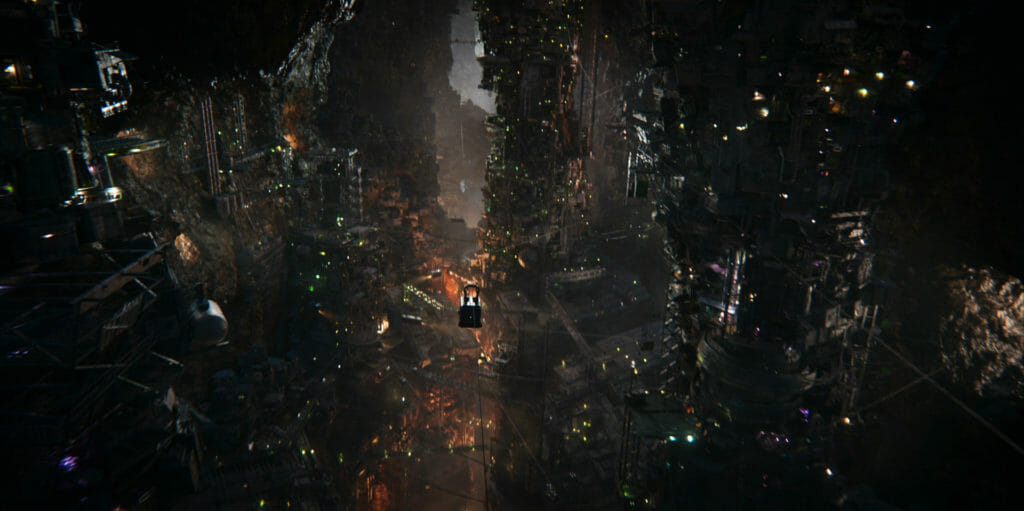
Kwan’s father was the leader of the primary UNSC opposition force on the planet, and his death brings forward new leadership under the UNSC apologist, Vinisher Graph (Burn Gorman). Graph suits the current UNSC agenda, and is left to his own haphazard rule of the planet – he will most likely become a greater antagonist as the series matures. Although Kwan’s initial introduction appears to place her as something of a reluctant ‘side-kick’ for Master Chief (a unique element of the series), where she serves a cliched comic relief role whilst most likely eventually becoming an inevitable vengeance seeker; it is clear her presence in the series will eventually be of larger importance.
Kwan is eventually captured for transport and approached via hologram by Dr. Miranda Keyes (Olive Gray) – who implores Kwan to relay a politically incentivised message to the outer colonies about the Covenant invasion. Kwan declines and threatens to do the opposite, subsequently becoming an enemy of the UNSC and a bureaucratic target for John to eliminate. This is a pivotal moment in the pilot, as it is the first time Master Chief is seen to choose a path outside of his given orders, something that he should not be able to do.
The subsequent fallout of John’s failure to execute Kwan is where the socio-political nature of Halo The Series comes to the forefront. Although almost completely devoid in the games, this political aspect of the show offers a truly intriguing and highly interesting look into how humanity operates its fleets, soldiers and, of most importance, the Spartans. In this way, the show bears resemblance to the excellence of The Expanse; where political espionage, dissidence and intrigue fuel a majority of the plot. It is evident these factors will play a large part in Halo The Series, delving into the questionable and ethical conduct of the UNSC, especially Dr. Halsey (particularly with the Spartan Program and how Cortana came to be); what it means to be an outer colonist and outcast; as well as offering a better understanding of the motivation and religious machinations behind the Covenant forces and their three prophets – Truth, Mercy and Regret.
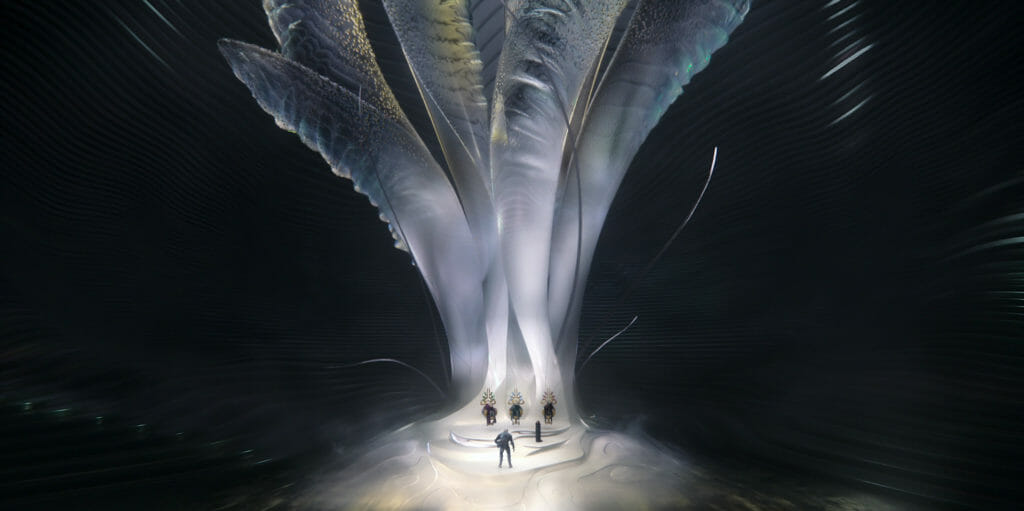
The Convenant in Halo The Series initially present as the main antagonists toward the human race, and for the moment this will likely remain true. However, in a substantial departure from the games, an all new character has been introduced by the name of Makee (Charlie Murphy). The most intriguing element of this character is how she appears human, yet she is unequivocally part of the Covenant. Although her true role continues to remain a mystery, at least for now, it may be surmised how the Covenant need ‘special humans’ in order to use and activate the ancient alien artefacts; which gamers will quickly recognise as Forerunner in nature (no doubt planned as a greater reveal with more exposition as the series matures). Alternatively, her role as the Covenant’s “chosen” may be a red herring or a clever and ironic twist to be revealed at a later stage (something only gamers will understand). Either way, her role is fascinating and it will be highly absorbing to see her character develop as the overall ‘silver timeline’ narrative begins to develop. Of course, the fact John can also interact with Forerunner technology will undoubtedly put a kink in the Covenant’s plans and the usefulness of Makee. Therefore, it will be interesting to see how the theology and politics of this revelation will play out alongside this new character and John’s emerging humanity.
The notion of “what it means to be human” appears to be a central tenet for the core narrative in Halo The Series. In this way, it serves as a wonderfully complex, if slightly messy, starting point for how the show will attempt to deal with the revelations brought on by the forthcoming juxtaposition between the beliefs of the Covenant and the true nature and implications of ancient Forerunner technology. Should the series follow a similar path to the games, the revelations of the fate of the universe will absolutely serve as an enthralling, engaging and entertaining arc. There are also small vines of narrative leading toward a very Star Wars like ‘dark’ and ‘light’ side, which may further explore the dichotomy between the relativism and dogmatism of what is ‘the truth’. It is clear the premiere of the series (first two episodes) attempts to set lofty foundations for future narrative, leaving viewers with far more questions than answers by the end of the second hour. Thankfully, there are more than enough tantalising tendrils for viewers to latch onto – especially those who choose to “hunt the truth” in order to “finish the fight“.
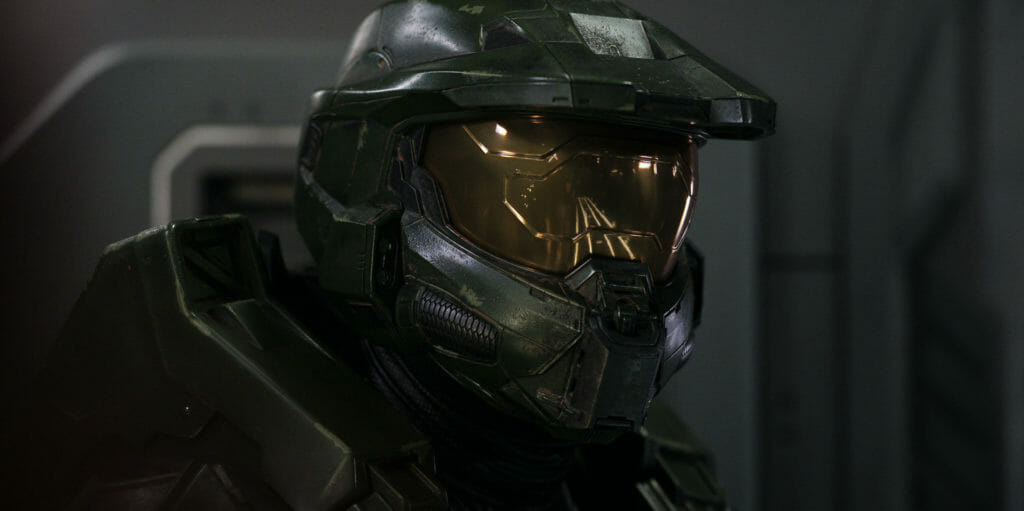
An undeniable fact of Halo The Series, however, is how good the production values are. For a television series, the show features incredible set pieces, cinema worthy computer generated imagery (CGI), and outstanding audio. The overall quality matches or sightly exceeds what is often expected from a television series (think The Mandalorian) and, at least visually, far surpasses those of the video games. It is also worth noting how the show does not shy away from overt violence; with the impact and power of weapons on full display. Overall, fans of the games will be in awe of the gravitas of Spartan armour, and will fawn in delight at how well the weapons, vehicles, locations and Covenant have been brought to life. Whether it is gazing in wonder at High Charity, the Covenant Holy City; looking into the horizon of Planet Reach, or listening for the trademark Halo theme in moments of narrative exposition; Halo The Series has the production splendour needed for a science-fiction based show to succeed.
The lofty ambitions present in the narrative and visual scope of Halo The Series are fully present in the two hour long premiere. Master Chief has been brought to life in the best way possible, by being instantly recognisable yet wholly unique and different to the character made famous in the games. In so doing, the series is able to broach theological and political angles only read about in the Halo books, therefore resulting in a world seemingly more well realised than the singular focussed stories found in the games. The result is a series with the heritage of the games, but bestowed with a clear slate from which to work and grow. Despite stumbling a bit in the initial development of the narrative, including several cliche characters and moments; the dichotomy of differing truths provides an engaging and exciting path forward for the show (including the hints of what is to come). This is clearly not the Halo gamers have grown up with, featuring a version of Master Chief who is not yet the hero the galaxy will eventually know him to be. Even so, it is most certainly Halo in every other way; which will hopefully make the reward worthy of the journey.
Verdict:
GOOD
| PROS | CONS |
| Great casting choices | Use of CGI can be overdone |
| Visuals and audio are incredible | Not a direct adaptation of the games |
| Interesting character development | |
| Intriguing narrative (different to the games – in the best way) |
Review access to title courtesy of Showmax
Review based on Episode 1 and 2 of Season 01 of Halo The Series.
Review Methodology | Ethics Policy
Owner, founder and editor-in-chief at Vamers, Hans has a vested interest in geek culture and the interactive entertainment industry. With a Masters degree in Communications and Ludology, he is well read and versed in matters relating to video games and communication media, among many other topics of interest.

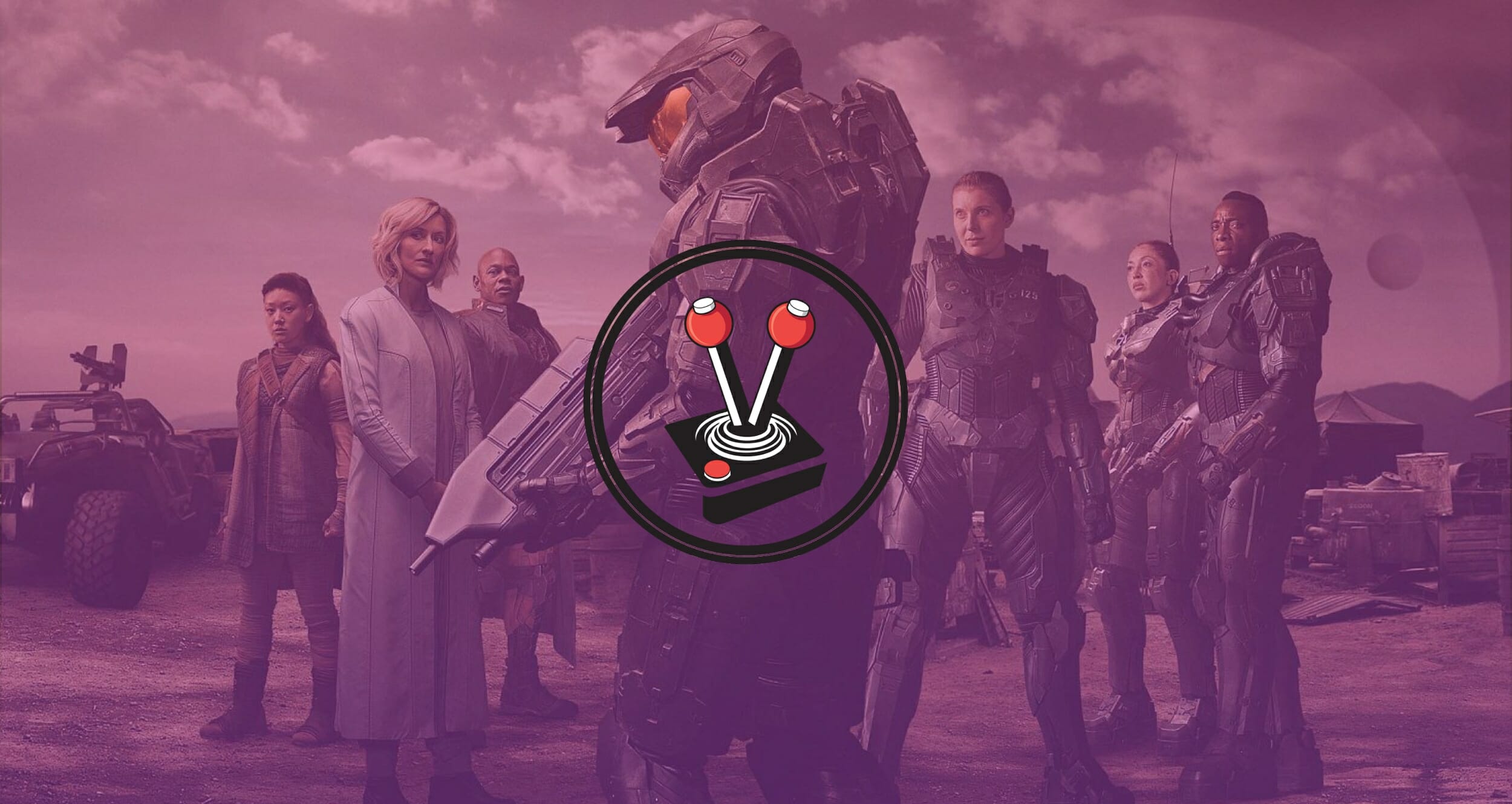
















![Borderlands: The Handsome Collection FREE for Xbox One [Weekend Only]](https://vamers.com/wp-content/uploads/2016/10/Vamers-FYI-Gaming-Borderlands-The-Handsome-Collection-is-FREE-for-Xbox-One-Limited-Time-Banner-01.jpg)
